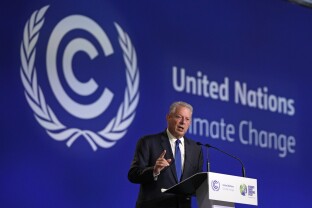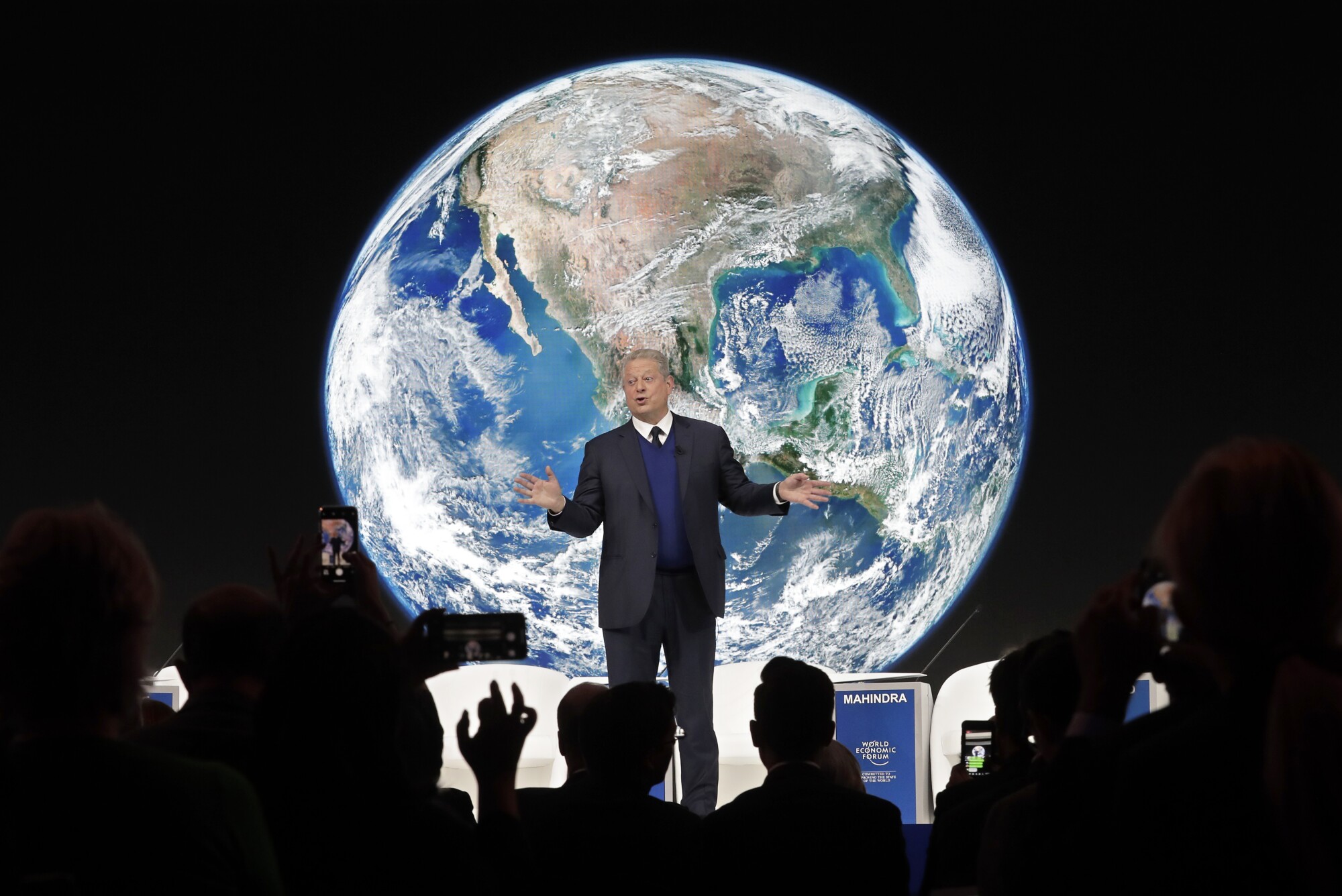When employees at Al Gore’s nonprofit, The Climate Reality Project, opened their emails on Dec. 15, 2023, they were greeted with a new edict: Do not discuss the war in Gaza at work, on email or on Slack.
“On behalf of the Executive Leadership team, I wanted to reach out about the memo emailed to us on Tuesday and then also shared with both staff and external partners on Slack,” Climate Reality Project CEO Phyllis Cuttino wrote to staff.
At the time, 15 employees had requested that leadership call for a cease-fire in Gaza, arguing that the Palestinian territories were among the most “climate-vulnerable in the world” and that the organization had “a duty to call out injustice.”
Cuttino acknowledged that “the tragic violence in the Middle East has been terribly distressing to all of us” and that “some of our own Climate Reality staff are acutely impacted with family and friends on the ground.” But she declared that the nonprofit would remain “a place where ALL staff feel safe, welcomed, and respected.”
“Climate Reality will not be issuing any public statement weighing in on the war in Gaza,” she added.
If the message was meant to settle the issue, it had the opposite effect.
***
Since that email, multiple Climate Reality employees have quit or been pushed out after clashing with management on the issue, according to interviews with nine current and former staffers. Roughly a quarter of the staff has turned over in the past year, the sources said.
Some of the employees who spoke to NOTUS said management suggested they would face disciplinary action if they discussed the conflict or voiced their opinions in more subtle ways, such as changing their Slack emojis to the Palestinian flag.
“There was a lot of intentional suppression from leadership,” recalled a former staff member, who alleged that management issued “several increasingly threatening” directives about the topic.
“There was this general sentiment where we weren’t to speak about it, [that] there would be consequences or it was, like, against the rules,” said Morgan King, who left Climate Reality in July.
“It’s a perfect example of refusing to engage in an issue that so clearly is related to our work because of the political implications that it might have,” said another ex-staffer, who cited restrictions on employee speech as a “major factor” in their decision to leave.
Many other staff members shared that view, arguing that the environmental destruction in Gaza warranted a public statement. Climate Reality has previously been vocal about other conflicts, such as the environmental toll of the war in Ukraine. Employees also pointed out that climate change is itself a politically controversial topic; they questioned why they weren’t allowed to talk about this specific issue.
“When they want to dip a toe in and it is aligned with Al Gore, they’ll do it,” said a current employee who is presently searching for a new job.
***
Tensions at Climate Reality mirror hand-wringing from Gore’s peers in the Democratic Party, most notably President Joe Biden and Vice President Kamala Harris. In the run-up to the November election, party leaders have awkwardly tried to uphold America’s longstanding allegiance to Israel while also trying to placate activists outraged by the devastation in Gaza. It’s a precarious, no-win position that may explain why Climate Reality’s leaders would prefer for employees to pretend the war doesn’t exist — at least while on the clock.
“It’s a challenging situation for Democrats, unquestionably,” said Christopher Borick, a professor of political science and the director of the Muhlenberg College Institute of Public Opinion. “What you have is an issue that’s strained the ability of the party to maintain a coalition.”
Borick sees obvious parallels between friction in the Democratic Party and an entity run by a legacy progressive like Gore. “For a lot of more centrist, perhaps older Democrats, they would value environmental engagement, environmental issues, but not necessarily weigh in on an issue like Gaza that they might have mixed feelings on.”
Frustration at Climate Reality has been growing since the beginning of the war. Last fall, sources told NOTUS an employee parted ways with the nonprofit after protesting the conflict on Capitol Hill, where he got into an argument with infamous then-Rep. George Santos. The reason for the employee’s exit was unclear, but some of his peers were “upset and disturbed” by his departure and believed it was related to his activism.
Then, in the spring, a protester at a Climate Reality training event was removed after speaking out in support of Palestinians. Some employees felt the demonstrator was removed more harshly than protesters from the Sunrise Movement at the same event, who had criticized speaker John Podesta’s climate record while serving as a senior adviser to President Biden.
Those activists were granted a meeting with Climate Reality leaders after their removal, while the Gaza protester was not.
When asked about the internal strife at Climate Reality, including a number of specific questions about the organization’s refusal to call for a cease-fire in Gaza, a spokesperson said the nonprofit is a “single-purpose organization, founded by former Vice President Al Gore, focused on taking urgent action to address the climate crisis by building a broad, diverse, and passionate coalition of advocates worldwide.”
“Our work within the broader climate movement centers around education and advocacy and is rigorously grounded in science,” the spokesperson continued. “This movement requires a variety of experiences, perspectives and diverse backgrounds as we tackle a complex problem that affects us all. We recruit, train, and mobilize advocates around the world to push forward ambitious climate action within their own communities and spheres of influence to help solve the climate crisis. Climate Reality is committed to supporting our staff, Climate Reality Leaders, and broader network in their work.”
Beyond the infighting over the war in Gaza, the nonprofit has endured other recent setbacks. Last year, one of its main funders abruptly died, leaving a multimillion-dollar hole in the budget. Filings showed that Climate Reality received nearly $23 million in total contributions in 2022; in 2023, that figure slumped to $16 million.
Most of the staff who spoke with NOTUS also complained about Climate Reality’s efficacy, saying that Gore, 76, sometimes advances outdated approaches to solving climate change and that his team is more concerned about appearing centrist than allowing staffers to fight polluters head-on.
“It just feels like Al Gore runs his organization like a political campaign,” a former employee said. “I’m sure there’s pros and cons to that, but as an organizer, I wasn’t able to effectively help.”
***
Gore emerged as a globally recognized voice for climate reform following the release of the documentary “An Inconvenient Truth” in 2006. The next year, he was awarded the Nobel Peace Prize for raising awareness about the climate crisis.
The Climate Reality Project, which Gore founded in 2006, allowed him to leverage his celebrity to generate grassroots action. The nonprofit is perhaps best known for hosting large training sessions for new volunteers, who then work in regional chapters to lobby for policy reform.
In 2023, Climate Reality organized campaigns against 23 petrochemical and fossil-fueled projects, and it helped secure new climate legislation in three states, according to its annual report. A spokesperson said the group has “a network of 3.5 million people globally, with trained Leaders from 190+ countries and territories, 10 international branch offices, [and] approximately 100 chapters across the US.”
Multiple current and former staffers applauded the awareness Gore has raised for climate issues, and they spoke fondly of the group’s regional volunteers. Local chapters have pushed for Los Angeles schools to go 100% green and have advocated for climate-friendly policies in the U.S. farm bill.
Still, some employees claimed that Climate Reality has at times overstated its impact.
“I had a lot of chapters that basically were like two old people, and we’d be like, ‘They contributed to this victory’ because one person sent it in a letter,” a former employee recalled. “It’s like, ‘OK, but did Climate Reality really do anything there?’”
Staffers also chafed at the nonprofit’s bureaucracy, noting that Gore’s team in Nashville, Tennessee, insisted on vetting key decisions. One ex-employee said the Washington, D.C., office took almost three weeks and seven rounds of edits to approve flyers for a canvassing project earlier this year.
“To me, that seems like a wildly ineffective organization if it takes that long to print a single flyer for a single community,” the person said.
Even after waiting out the bureaucracy, the organizers were sometimes left unhappy. For example, former employees were frustrated by Gore’s promotion of hydrogen-powered energy projects as a climate solution. In principle, they said, hydrogen initiatives are sometimes eco-friendly. But in practice, the beneficial projects are often approved alongside more harmful “blue hydrogen” initiatives, which simply convert natural gas to hydrogen.
Climate Reality does not endorse blue hydrogen as a climate solution, but organizers said they were obstructed from helping local activists fight it. “Al Gore likes hydrogen, so we’re not allowed to help them sign their petitions or do any of our actual work. We have to only help them on the down-low,” a former employee said.
Bailey Fullwiler, who worked as a regional organizer for Climate Reality until July, said she frequently felt like she had to “protect my community members from Climate Reality Project and almost fight for them every day.”
“It was just really emotionally exhausting,” she said.
Another ex-employee told NOTUS that what Climate Reality preaches is “very much focused on a science-based solution to climate change, educating people around the world, focusing on a just transition.”
“And so oftentimes we’re seeing mission stray and vision stray in order to advance the political protection of the former vice president,” this person said.
***
Current and former staff members alleged that Gore and his team promote outdated initiatives that won’t actually solve the climate crisis, such as electric cars, which are unlikely to be the panacea activists once hoped they’d be. Those positions have alienated some of Climate Reality’s younger workers.
“I’ve never worked somewhere that has a higher turnover of people at entry-level roles, especially young organizers,” an ex-employee said.
Opinions on Gore remain split, said King. His acolytes “adore him and view him as kind of a savior of addressing climate change.”
“And then there’s the folks that have been kind of questioning the decision making, the transparency and the policies of leadership, like myself,” she said.
King noted that the mythology of Gore is deeply rooted in Climate Reality’s DNA, nearly to the point of a “cultish energy.”
At a staff retreat in January, employees played a round of “Al Gore Jeopardy!”
“It’s just kind of strange,” she said.
—
Noah Kirsch is a freelance reporter.
Sign in
Log into your free account with your email. Don’t have one?
Check your email for a one-time code.
We sent a 4-digit code to . Enter the pin to confirm your account.
New code will be available in 1:00
Let’s try this again.
We encountered an error with the passcode sent to . Please reenter your email.



